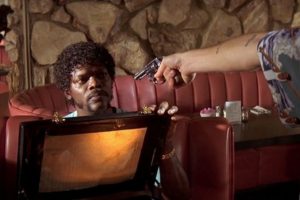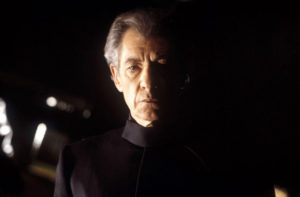I have a confession to make-I didn’t start watching Doctor Who until after my husband and I started dating.
I know, I know, most self-respecting geeks are at least familiar with the Doctor. Me? Nope. As a matter of fact, two friends and I went to England a few years back. Naturally we went to watch the Changing of the Guards at Buckingham Palace. I’d seen it before, but the others hadn’t, so we went.
During the rather dull ceremony (sorry, it’s the truth) the band played some great sci-fi music, including Star Trek. A number I didn’t recognize received thunderous applause from the crowd. Lucky for me, the friend standing next to me at least knew that it was the Doctor Who theme song.
While we were dating, my soon to be husband finally talked me into watching. The first season of the reboot is rough, and I didn’t particularly love Rose as the companion, but once I’d made it through a handful of episodes, I started to get it.
Then The Empty Child happened.
If you’re a fan, you know what I’m talking about.
The entire two-part story is based in World War II London, and through the whole thing a little boy in a gas mask keeps appearing asking if anyone and everyone is his mummy.
Seriously creepy.
I spent the entire episode trying to figure out what sort of wretched creature would do such a thing. Then the reveal at the end blew my proverbial socks off. It went so contrary to where I thought it would, that I probably sat with my mouth hanging open for a good fifteen seconds.
While my boyfriend pointed and laughed at me. (He’d seen it two or three times.)
The writers of Doctor Who have pulled this off a number of times. My personal favorite is Gridlock:
 The Doctor takes Martha to New Earth, where she is kidnapped by two carjackers and taken to an underground Motorway, where the remainder of humanity on the planet live in perpetual gridlock.
The Doctor takes Martha to New Earth, where she is kidnapped by two carjackers and taken to an underground Motorway, where the remainder of humanity on the planet live in perpetual gridlock.
What is left of humanity has been circling on the futuristic freeway full of flying cars/motor homes for who knows how long (years? Decades? Centuries?) trying to find an exit open. About half way through the episode we, the audience, figure out that they’re never getting off the freeway. It’s some sort of sick trap.
Well, the Doctor won’t stand for it (he’s got a very insistent need to protect humanity) and he and Martha set out to figure out what’s going on.
Adventure ensues.
But once again, when we expect to find a creature that is both parts cheesy and foul, we find something totally different. A friend of the Doctor’s who moves through time at a different rate than most. And he didn’t trap humanity underground on the freeway because he was mean, but because he wanted to keep them safe from whatever catastrophe happened on the surface of the planet..
It’s brilliant. In so many places the writers allude to something, and then allow the watchers to come to their own conclusions, which are totally wrong.
For me, this is one of the best thinks a story can do. Not so much trick the reader, but provide an insight that can truly delight them at the end.

 Quentin Tarantino even pokes a little fun at the audience in the ending scene, excerpted above. When Jules opens the case and shows the contents to Ringo/Pumpkin, all we (the audience) knows is that the case is valuable and, now that it’s opened, it gives off a mysterious glow that takes everyone’s breath away. Now we want to know what is in the briefcase, but Jules slams it shut and wraps up the scene and the movie. We never find out what was the impetus of over two hours of craziness. Don’t believe me? Just Google “pulp fiction briefcase” and enjoy 174,000 hits and lots of pages with different theories, including Kryptonite and Marcellus’ soul.
Quentin Tarantino even pokes a little fun at the audience in the ending scene, excerpted above. When Jules opens the case and shows the contents to Ringo/Pumpkin, all we (the audience) knows is that the case is valuable and, now that it’s opened, it gives off a mysterious glow that takes everyone’s breath away. Now we want to know what is in the briefcase, but Jules slams it shut and wraps up the scene and the movie. We never find out what was the impetus of over two hours of craziness. Don’t believe me? Just Google “pulp fiction briefcase” and enjoy 174,000 hits and lots of pages with different theories, including Kryptonite and Marcellus’ soul.

 In the first half of Gillian Flynn’s bestseller Gone Girl, I was amazed. Flynn’s ability to communicate small issues in a marriage, how they can appear and fester just under the surface, was revelatory to me. I sure didn’t pick up Gone Girl expecting such an accurate and subtle commentary on American marriage and the differences between blue-collar and white-collar partner philosophies.
In the first half of Gillian Flynn’s bestseller Gone Girl, I was amazed. Flynn’s ability to communicate small issues in a marriage, how they can appear and fester just under the surface, was revelatory to me. I sure didn’t pick up Gone Girl expecting such an accurate and subtle commentary on American marriage and the differences between blue-collar and white-collar partner philosophies. Similarly, in Flynn’s novella The Grownup, the reader is presented with an anti-hero that, at first blush, seems honest and straight forward about who she is: a fake psychic. I’ll not mention her former job so you’re surprised when you read the short story yourself (I’ll just say this: the first two lines of the story are some of the best opening lines I’ve ever read. Talk about a hook! Winky wink). Now, as we, the readers, follow this opportunistic woman, we fall into a haunted house/evil stepson-type scenario. Nothing too surprising here – they are common horror movie tropes. And our protagonist, although a con artist of sorts, still has some admirable attributes, and it’s easy to slip into the story from her perspective. We’re even on her side. (Big spoiler here, so skip to the next paragraph if you want to read this story.) We’re on her side, that is, until we realize too late that she’s not an anti-hero – she’s the villain, and became so under our very noses. And this is Flynn’s trademark. Unreliable narrators to an extreme. Characters that seem like unreliable narrators and anti-heroes who become the villains before the reader can put two and two together.
Similarly, in Flynn’s novella The Grownup, the reader is presented with an anti-hero that, at first blush, seems honest and straight forward about who she is: a fake psychic. I’ll not mention her former job so you’re surprised when you read the short story yourself (I’ll just say this: the first two lines of the story are some of the best opening lines I’ve ever read. Talk about a hook! Winky wink). Now, as we, the readers, follow this opportunistic woman, we fall into a haunted house/evil stepson-type scenario. Nothing too surprising here – they are common horror movie tropes. And our protagonist, although a con artist of sorts, still has some admirable attributes, and it’s easy to slip into the story from her perspective. We’re even on her side. (Big spoiler here, so skip to the next paragraph if you want to read this story.) We’re on her side, that is, until we realize too late that she’s not an anti-hero – she’s the villain, and became so under our very noses. And this is Flynn’s trademark. Unreliable narrators to an extreme. Characters that seem like unreliable narrators and anti-heroes who become the villains before the reader can put two and two together.